The Checker Maven
The World's Most Widely Read Checkers and Draughts Publication
Bob Newell, Editor-in-Chief
Published every Saturday morning in Honolulu, Hawai`i
Noticing missing images? An explanation is here.
Theft! Problem Composing Contest 64

The fellow above is committing a felony and we sure hope he gets caught. The poor woman victim is going to have a nasty surprise, and a lot of headaches, when she realizes her wallet is gone, with all her cash, credit cards, and documents. Theft, especially from someone vulnerable, is truly reprehensible.
However, in our game of checkers theft might bring you praise instead of jail time, although the victim still isn't going to be happy. In this, the 64th of Bill Salot's amazing problem solving competitions, theft--- of the checker variety--- is the theme. You can access the contest problems here. Do try all the problems and be sure to vote for the one you think is best.
Mr. Salot sent us a "teaser" problem to introduce the concept.
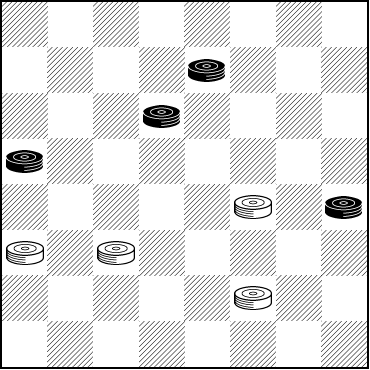
WHITE
White to Play and Win
W:W19,21,22,27:B7,10,13,20
A rather nice little challenge, so try it and don't rob yourself of some real solving pleasure. When you're done, you can steal a look at the solution by clicking on Read More.![]()
A New Season at the Beacon Cafe
It was the Saturday after Labor Day, 1955, and to Sal Westerman that meant one thing.
The new "season" would open for the Coffee and Cake Checker Club, of which Sal was the informal leader. The summer break was over (the club broke off its weekly meetings after Memorial Day) and every Saturday from now on, except for the Thanksgiving and Christmas holidays, the "boys" (all of whom were at least 50 years old) would gather at the Beacon Cafe, to enjoy coffee, some of the best baked goods to be found anywhere, and of course comradeship and checkers.
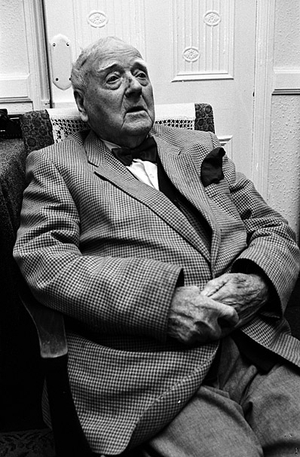
Sal Westerman
There was a spryness in Sal's step as he left his home for the ten minute walk to the Provident Life Building, where the Beacon Cafe was located. Sal left early so he could arrive first and welcome the boys back.

Deana Nagel
On reaching the Beacon, he greeted the proprietress, Deana, who was all smiles. "Welcome back, Sal," she said, "great to see you again!"
"How was the soybean crop this year?" Sal asked. Deana closed the Cafe during August so she could go to the family farm in Gackle and help out with the busy harvest season.

"Oh, pretty good," Deana replied, "but it's always nice to get back here and bake treats for my favorite customers. Walnut chocolate chip bars today, you know!"

"Sounds great," Sal said, and just then in came some of the boys: Delmer, Wayne, Sam, and Louie. There were greetings and handshakes all around and wouldn't you know, here came Tom, Ron, Dan, Mike, and even the seldom-seen Frank! That made for a turnout of ten, a really big crowd. Everyone got their coffee and this week they needed two of the big booths in the back of the Cafe.
Now, the tradition was that Sal would bring along a checker problem with which to challenge the boys. If they could solve it, Sal would buy the treats for everyone. If they couldn't win it, the boys would buy for themselves and Sal.
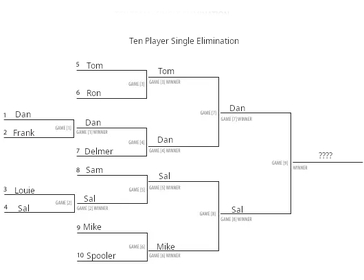
But this time Sal said, "Let's try something different. How about we have a quick single-elimination tournament, half a minute per move, play until someone wins in each match-up, and the overall winner shares the glory by buying the treats?"
Louie thought that the winner, being the winner, maybe shouldn't have to buy, but he went along with the crowd, who thought it would be more fun that way.
Dan
The little tournament quickly got under way and within 90 minutes or so, it was all down to Sal and Dan, so this final game would be decisive. They agreed that if it was a draw, they would share the honors and share the cost of the treats.
Now, Sal was the State Champion and favored to win, and he wanted to win, for he was a very generous person and especially wanted to buy for everyone on the first week back after the summer. But he would have to win that "right" over the board.
After some brief play the following very unusual position arose, with Sal to move. He knew he had a chance to win but he only had half a minute to figure out the right play, and it looked really complicated.
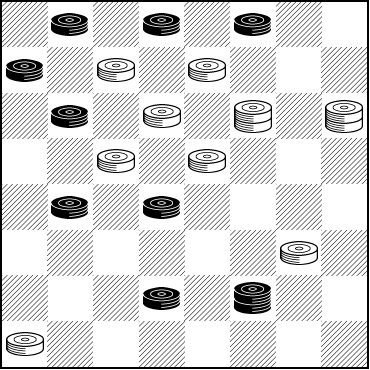
WHITE (Sal)
White to Play and Win
W:B1,2,3,5,9,17,18,26,K27:W6,7,10,14,15,24,29,K11,K12
Just at the very end of his half minute, when Dan was about to call "time" Sal made his move.
Can you win this one? Do you think Sal found the winning way? You won't have to buy treats (unless maybe you're solving in a group), but you can still claim a little personal glory. See how you do and then click on Read More to see the solution and the rest of the story.![]()
Labor Day 2022

Things have improved for the working person since last Labor Day. Unemployment is low and many employers are desperate to make hires. Wages are up at least a little, although inflation is a big worry and fingers crossed that there is no recession.
But we should always remember the reason for the Labor Day holiday, which is to recognize the millions of working people that have made and continue to make America a great nation. Without the hard workers who fill every conceivable kind of job and perform every conceivable type of task, where would we be? Each and every worker is important, and each and every worker deserves respect and recognition.
Checkers in the past has been thought of as the working person's mind game. We like that description. So to celebrate the day, as we always have in the past, we turn to an American problem composer, Tommie Wiswell, and a composition he calls All Around the Mulberry Bush.
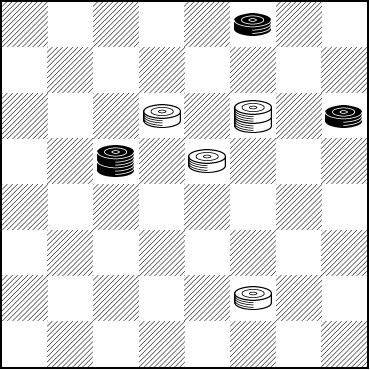
WHITE
White to Play and Win
W:W10,K11,15,27:B3,12,K14
We'll give you a small hint by saying it's the patient and careful worker that brings home the bacon. Work away at this one and see the fruits of your labor. Clicking on Read More will show you the solution.![]()
Marvin J. Mavin: A Very Large Problem

The Detroit Doublejumpers had just completed annual pre-season training camp at the appropriately named location of Au Train, Michigan. It was always a difficult time for the players, who were really put through their paces both mentally and physically, but no one more so than team Captain Marvin J. Mavin, who had to give up beer, run endless laps around the lake, and even do push-ups sometimes.
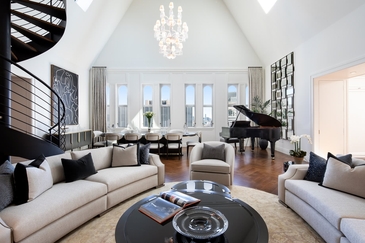
After camp the team had a traditional week off before they played some exhibition games prior to opening the regular season. It was a Saturday afternoon and Marvin was visiting with his fiancee, Priscilla Snelson, at her very large swanky new condo, one she bought after she was made CEO of Rust Belt Holdings, a position which came with a very large salary.
Priscilla and Marvin planned on a relaxing afternoon together followed by dinner at a restaurant chosen by Priscilla ... which, of course, was upscale and expensive, boasted two Michelin stars and featured a very large French menu.
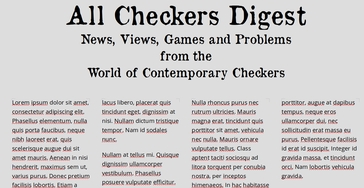
Marvin was on one of the couches in the very large living room, reading an issue of All Checkers Digest. The magazine always contained a few challenging checker problems and Marvin was just starting to really get involved with one of them.
BLACK
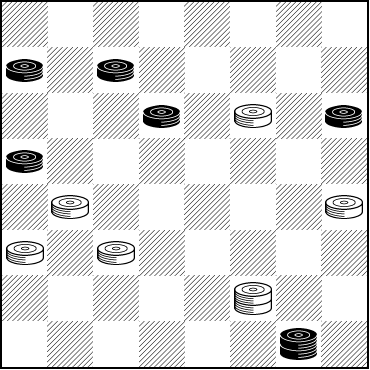
WHITE
White to Play and Win
W:W11,17,20,21,22,K27:B5,6,10,12,13,K32
"Marvin, dear!"
Priscilla's voice, sweet though it was, cut through Marvin's concentration.
"Yeah honey, what is it? Hey, by the way can you bring me a beer? I'm working on this problem ... "
The voice now took on a definite edge. "Get your own beer, dear, and while you're at it come over here. I want to show you something."

Marvin reluctantly got up and went into the very large kitchen. Priscilla was seated at the very large kitchen table with magazines of her own spread out in front of her. "What do you think about this, Marvin? It's in the latest issue of the Beautiful Blissful Bride's Best Boutique magazine ... "
"Bride's Best ... what did you call it? Bo Peep or something? Hey, anyhow, they got a checker column in that magazine?"
"Marvin, be serious!" Uh-oh. Marvin knew it was never good when Priscilla told him that. She continued, "I want to know what you think of this bride's dress for our wedding."

Now, Priscilla was planning a very large wedding. They had yet to set a date but she said it would take her at least six months, and probably a lot longer, to get everything arranged. There would be a very large guest list, a very large cocktail party, a very large dinner, and a very large send-off following a very large dance party.
Marvin, knowing that, unfortunately replied, "Gee, Prissy, the wedding ain't for probably a year yet, what's the rush? And besides I don't know nothing about wedding dresses."
"Marvin! I don't think I like your attitude. And how many times have I told you, don't call me Prissy!"
Marvin quickly backtracked. "Aw gee honey, I'm sorry. Here lemme see the dress."
Priscilla relented, but only a little. "Here you go," she said, pointing to a very large centerfold in the magazine.
"Yeah, great! Sure does look like a wedding dress, don't it? I mean, it's got all of them ruffles and stuff ... but I kinda think you don't look like ... "
Priscilla, now very angry, slammed the magazine shut. "Oh Marvin, you're so ... so ... useless! How will I ever get this wedding arranged if you don't help?"
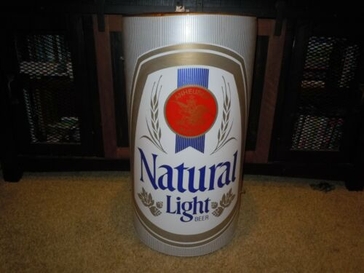
"A beer right now would help ... ' Marvin said, again unthinkingly.
Priscilla stood up, hands on hips. Once more, not a good sign. "You'll get a beer over your head!" she said. "And don't open that fridge ... or else! It's getting close to time to leave for Le Faux Luxe in any event.
Marvin, who was halfway to Priscilla's very large fridge, stopped in his tracks. "Aw, gee, Prissy, gimme a break. One beer, okay? That fancy place ain't got nothing but old wine and them funny colored cocktails."
Priscilla, still glowering, thought for a moment. "You know, Marvin, you're right. You need a beer. You don't need an elegant candlelight dinner of haute cuisine, fine wine, and superb service. So how about you take your silly checker magazine and go down the block to that bar you love so much and have a beer and a burger? You can call me in a couple of days when you've seen the light and are ready to help with the wedding."
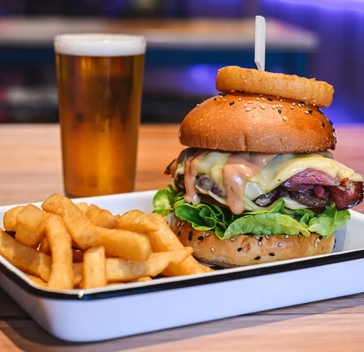
"Hey, yeah, can I have fries with ... oh, okay." He quietly picked up his All Checkers Digest, went out and took the elevator down to street level. At least he had a very large beer and a very large burger to look forward to. With fries. Of course, making up with Priscilla would be, as always, a very large problem, but he'd work it out.![]()
A Saturday in August

It was August, usually one of the hottest months of the year in Bismarck, North Dakota, and 1955 was no exception. Although North Dakota is often rightly thought of as a very cold place, summers, though brief, could be scorching hot, with temperatures above a hundred degrees on some days.
Sal Westerman, the unofficial leader of the Coffee and Cake Checkers Club, usually stayed in town during August. His wife Sylvia always went to Dickinson to spend two or three weeks with her sister, and while she was away Sal would retreat to the relative coolness of his basement to read his checker magazines and do some study from his large checkers library. The Club didn't meet during the summer, and in fact their usual venue, the Beacon Cafe, closed down in August so the proprietress, Deana, could go to Gackle to visit with family and help with the wheat harvest.

On this Saturday the temperature reached 105 degrees in the early afternoon, and Sal didn't plan to leave his basement except if absolutely necessary. There was a bathroom as well as a small refrigerator, and it was just too hot to venture into the upper floors of the house. But by later in the afternoon even the basement was just too hot. Still, there was nowhere else to go. The big floor fan was already at full blast. Nothing to do but stick it out.
Sal had been working from a new problem book that All Checkers Press had just published. Sylvia had given it to him as a birthday gift. It was a nice collection and included problems by two of his checker pen-pals, Brian and Ed.
The heat was starting to make Sal, who after all was in his seventies, a bit sleepy. Then Sal did something that he didn't do very often; he got a beer from the fridge and opened it up. Sal would have the occasional social drink but seldom anything but that. It was the heat, and he wanted something cooling. It was too hot to eat anything, but a cold drink would be nice.
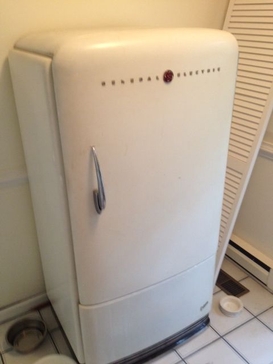
Sipping his beer and working on a few problems, he suddenly became aware that the room was getting darker. Now, the basement wasn't all that large. There was the furnace, of course, a half bath, a lot of storage cabinets, a workbench, an easy chair and an old couch, and a small table in the middle served by a couple of battered kitchen chairs. There were several casement windows on the walls, up near the ceiling. There was an overhead light and a couple of floor lamps.
Now, it was odd. The lights were all on but they didn't seem to be giving off more than a faint glow. Sal looked up at the windows and it was pitch black outside. Was it storming, or had he fallen asleep and it was now well after dark? No, his beer was still cold, in fact ice cold, colder than the old fridge could have ever made it.
Sal thought he had best go upstairs and check around. That's when he got the biggest surprise of all.
There was a wall where the stairway leading upstairs used to be. Not even a new looking wall, but just a continuation of the walls in the rest of the room.
Sal started to be frightened. This just wasn't possible ... was it?

And there was an eerie silence. Not a sound came from outside. Another shock: the electric wall clock had stopped, the second hand no longer sweeping, the time 11:52. Eight minutes until midnight, Sal supposed. But if the electric clock was stopped, how could the electric lights be on, even though only barely?
Now, stay calm, Sal told himself. Sit down at the table, take a few deep breaths.
The table was gone. So were the chairs. In fact everything in the room seemed to be fading away, as if darkness were seeping in and dissolving reality.
The walls were no longer visible, nor were the floor or ceiling. Sal now felt a floating sensation, and then a breeze that turned into a wind that pushed him along in total darkness.
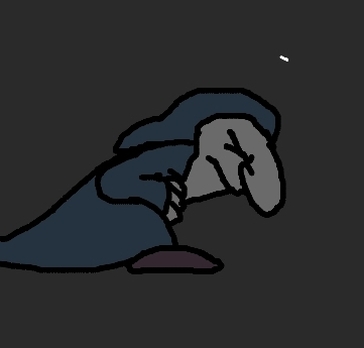
It seemed to go on forever, the wind stronger and stronger, Sal being carried faster and faster. And now along with the darkness he heard an unearthly howling that grew so loud Sal thought his ears would burst.
Suddenly it was over.
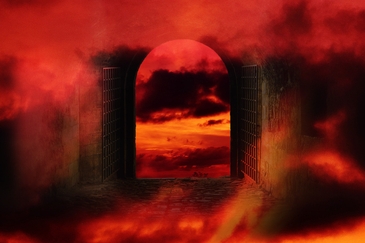
Sal was standing in a large room, in front of a long table. Everything in the room was glowing red as if on fire. Seated behind the table were Brian, Ed, and--- Sylvia! After a moment, Sylvia spoke. "You have been called before this tribunal to stand in judgment. How do you plead, guilty, or guilty?"
Sal was in shock. Finally he managed to say, "Have I died? Is this the Last Judgment? But why aren't there ... you know ... angels and ... St. Peter? And Sylvia ... why are you here?"
"Answer the question, mortal. Do you plead guilty, or guilty?" Brian said.
"Yes," added Ed, "you must plead either guilty or guilty. After all, we know you're guilty, don't we?" Ed laughed manically and the others joined in, the laughter swelling and ringing in Sal's ears.
"Guilty of what?" Sal said. "I say, not guilty of ... whatever it is!"
"Not guilty?" said Sylvia. "You must plead either guilty, or guilty! Everyone must obey! Everyone is guilty and everyone is condemned! We do not accept your plea and we find you guilty. You are hereby sentenced to ... "
Sylvia paused and waved her arms at Brian and Ed. "All together now boys, let's hear it ... "
Sal opened his eyes. His head was resting on his new problem book and he was drenched in sweat. Slowly, he raised his head and looked at the electric clock. It was nine o'clock and, glancing at the windows, he saw it was getting dark.
He must have finished all of his beer, as the bottle was empty.
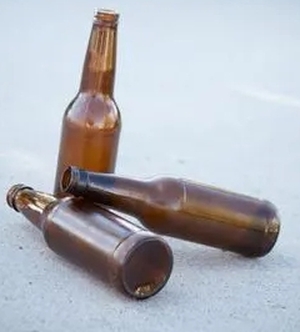
Uh-oh. There were three empty beer bottles on the table. Guilty, or guilty? Everything fell into place and Sal understood.
Sal took one last look at his checkerboard, which had the following position on it.
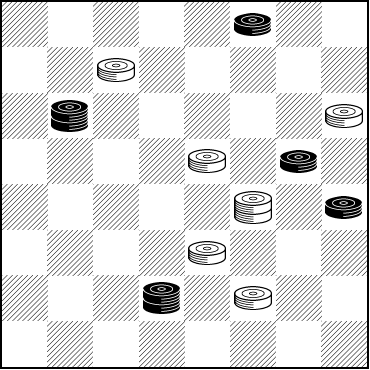
WHITE
White to Play and Win
W:B3,16,20,K9,K26:W6,12,15,23,27,K19
But he shook his head and said to himself, "Too much checkers today. Too much heat. Too much beer. Too much ..." He shook his head again. He had had a terrible dream. "Better just get to bed," he concluded, "and it sure will be nice when Sylvia--- the real-life Sylvia--- gets back home."

Sylvia Westerman
We hope you don't ever have a bad dream like Sal's. We also don't recommend three bottles of beer on an empty stomach, or at all for that matter, especially when solving checker problems. Can you solve the position shown above? Don't let it give you nightmares; you can always click on Read More to see the solution.![]()
A Good Coach

Our Checker School series has featured several problems and excerpts from Andrew J. Banks' quirky but fascinating book Checker Board Strategy, published back in 1945. Mr. Banks came up with a set of characters, such as Farmer Sneed and Skittle, whom he utilized in short sketches to illustrate various principles related to learning the game of checkers.
Here's a short sketch Mr. Banks entitled A Good Coach.
A Good Coach
Said Aristotle, "The one exclusive sign of a thorough knowledge is the power of teaching." The popular Internationalist, has this power. He usually preferred to demonstrate problems, rather than games. In studying a game is not the student tempted to merely guess at the reasons for the moves? However, in solving a problem, he must think accurately. The Internationalist, without using a board, often solved all the problems in an issue of Wood's Checker Player. With amazing speed, he solved gems that players set up for him; he has mastered over 25,000 problems. Moreover, his teaching ability equaled his great skill.
His method was to tactfully indicate where and why Skittle had failed to solve a problem. Skittle's second attempt consequently was superior to the first; whereupon the Internationalist warmly congratulated him; and this made Skittle energetically try to solve more problems. Encouragement does not make a pupil wiser, but it does enable him to endure correction. Said Mr. Johnson, "The applause of a single human being is of great consequence."
What Skittle learned served him well; he felt that his play was his own---not his teacher's. He received excellent advice and theories, but no set rules. There are no formulas in checker playing---each player must develop his own style. He should remember that study and copy are two different things.
Skittle developed the feel of the game, an observing eye, and new exciting ideas. How did he learn so rapidly? He made mistakes, corrected them; made more, corrected THEM; and repeated this process over and over. Great things are performed not by strength but by perseverence.
In the story, Mr. Banks refers to the "Internationalist." There are several players who were called that. We're not sure who he means. We think it might be Harry Moulding, but we don't know for sure. Can any of our readers shed some light on this?
In any event, here's the problem Mr. Banks provided to go with his little tale.
WHITE
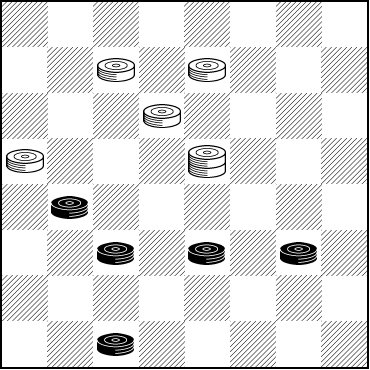
BLACK
Black to Play and Win
B:WK18,20,23,26,27:B3,9,10,11,16
Depending on your skill level, you might need a little coaching on this one. It's quite clever and pleasing. See how you do and then coach your mouse over to Read More to see the solution.![]()
Easy As Pie
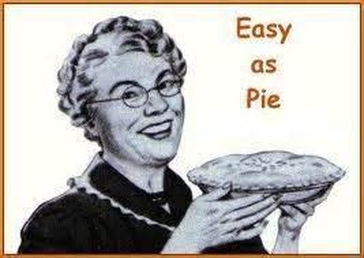
We've all heard the expression "easy as pie" to refer to something that is indeed very easy. But finding the origins of this expression is not quite as easy as pie.
There are a couple of theories. In 1855 the expression "nice as pie" appeared in print. In 1884 Mark Twain wrote "polite as pie." In 1886 "it's like eating pie" was found in Sporting Life. Finally in 1887 we see "it's as easy as pie" in the Newport Mercury.
Another idea traces back to pre-Reformation England, when the rules for computing the date of Easter were called "Pie." The theory goes on to speculate from the context that "Pie" originally meant something overly complicated and morphed into something that was in fact very easy. This seems a bit of a stretch.
And the most unusual idea of all relates the expression to the Maori word "pai" which means "good" and perhaps led to the Australian expression, in the 1920s, "pie at" or "'pie on" which meant "to be good at something" which was itself perhaps "easy as pie." This also seems a bit contrived.
We'll go with the explanations from the 1800s, and present a speed problem which is indeed as easy as pie.
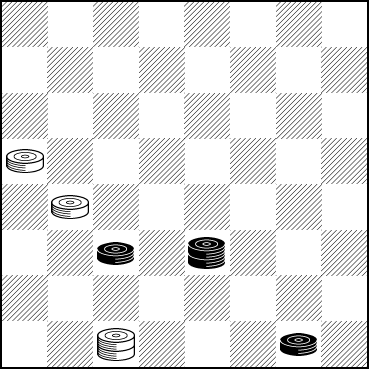
BLACK
Black to Play and Win
B:W20,16,K3:B11,1,K10
Most players will solve this instantly. See if you solve it at first glance. Novices may have to think a bit but also should be able to get it. No matter your status, treat yourself to a piece of pie after you've verified your solution by clicking on Read More.![]()
December Downtime

We anticipate The Checker Maven website being down or inoperable during the period of December 26 to December 30, 2022, as we convert the site from HTTP to HTTPS.
The conversion is long overdue. Some web browsers are starting to block access to HTTP sites for security reasons, and this practice will likely become universal before long.
Please be patient and accept our apologies for any inconvenience. We'll post more about this as we get close to the planned dates.![]()
Joe Schwartz Reflects on Checkers Experiences
A Guest Column by Dr. Richard Beckwith
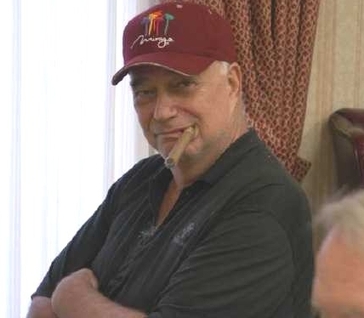
Joe Schwartz (circa 2003)
Joe Schwartz has been on the checker scene for decades. In addition to always having plenty of stories to tell, Joe interacted with many of the checker greats of the past. For example, Joe's father even once arranged a checker lesson for Joe from the great Willie Ryan, who was from Bronx, NY at the time. Mr. Ryan explained to a young Joe why certain moves were made in various openings. Willie Ryan had come down for a day to put on an exhibition at the YMCA. Joe has a picture of this day (with him in it) hanging in his home. Men typically wore suits and neckties in those days.
In the 8th International Match Book, Joe mentioned one of his biggest thrills was winning his first tournament as a teenager in Poughkeepsie, NY, the city where Joe was born. There were about 30 players, and Joe was the youngest. Joe only played GAYP back in those days, as there wasn't any three-move restriction activity around him until later in life.
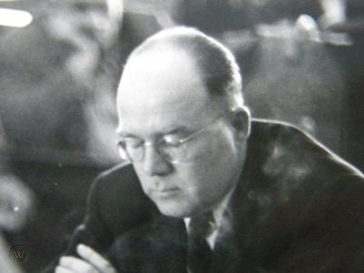
Tom Wiswell
Tom Wiswell lived in Brooklyn. Wiswell came to an exhibition for chess and checkers, where Joe got a book from him. Joe last saw Wiswell at central Park. Tom Wiswell once commented to Joe that the checker position looks different if you get up from your chair and go look at the board from the other side. Joe also mentioned that New York City had a checkers academy on 42nd street where good players met to play for money.

Richard Hallett
A checker friend Bill Wallace was with Joe during a Florida break and took Joe to a park, some 50 years ago. This is where Joe encountered Richard Hallett again. (Mr. Hallett also lived in Poughkeepsie, NY and fed Joe's cat whenever Joe was away. Later in life, Richard lived in Joe's Florida residence high-rise building.) The three players drove together to the St. Petersburg tournament, where Joe first met Marion Tinsley. Joe asked Tinsley his opinion of what is the better defensive move in the Switcher: 30-25 or 17-14 (from the run-up of 11-15 21-17 9-13 25-21 8-11 and now white to play). Tinsley replied, "30-25 is the better move."
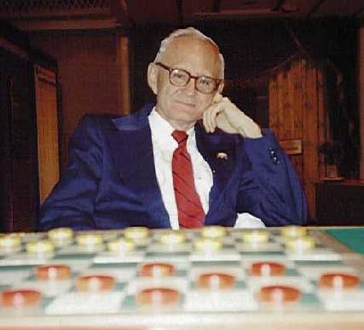
Marion Tinsley
Joe Schwartz moved to Florida in 1991, living with Bill Wallace a few months before locating to Hallandale, Florida (still his place of residence today). Joe's tradition of housing visiting checker players for the night goes back to his New York days, where he hosted the likes of Norm Wexler, Ed Bruch and Harold Freyer. Over the years, Joe sponsored matches between Richard Hallett with both Derek Oldbury and with Elbert Lowder, putting up Lowder and Oldbury (in wheelchair) for the match duration. Joe recalls Derek Oldbury being a very intellectual man who liked classical music, but was not into watching television. His wife Joan was also in a wheelchair.
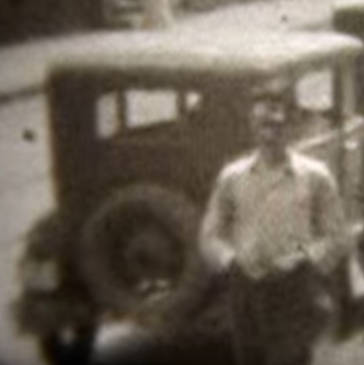
Harold Freyer
Harold Freyer once lost a game to Bill Levine at a tournament in Joe's home. In the second game, Freyer eagerly sought revenge and had Levine in a troublesome ending. Mr. Freyer suggested to his opponent that he resign the position in view of the caliber of his opponent. Bill Levine grabbed a pencil, pointed it at Harold, and said, "I have a right to play this game out." Harold snatched the pencil out of his hand. Tempers started to flare, and Joe had to come over to diffuse the situation. Harold shot back at Joe, "I've been thrown out of better houses than yours!"
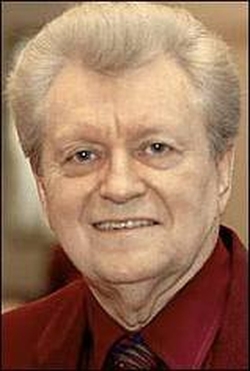
Charles Walker
Joe recalls two other incidents that led to checkers flying off the board. One was Al DuBois vs. Charles Walker. After some apparent ribbing, Mr. Dubois threw the checkers, one of which hit Mr. Walker's wife around the eye and required medical attention. The other was the last game of the National Tournament between Elbert Lowder and Ron King. Elbert appeared to have the tournament won with an apparent even ending on the last game of the tournament that most players would quickly call a draw. But Suki, needing a win, wanted to play the position out further. After some fast moving, Elbert allowed a trade that allowed his remaining pieces to get trapped with the move, which resulted in checkers flying across the table. A position on a nearby non-Master game was disturbed, and they weren't recording their moves to allow reconstruction of their position.
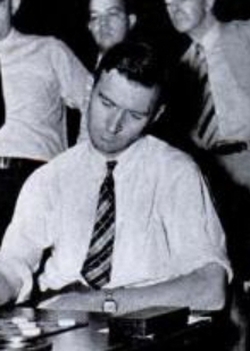
Asa Long
In additional to having several lunches with Marion Tinsley, Joe had dinner with Asa Long ("a very humble man") and even helped take Mr. Long to the hospital after his health issue that occurred shortly after the start of the 1988 U.S. National in Danville, Virginia.
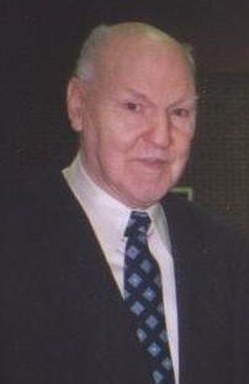
Elbert Lowder
One time Joe Schwartz was playing Elbert Lowder in a tournament on a Single Corner opening. Joe encountered some difficulty with his current game and remarked to Elbert, "I wish I had time to analyze this position." Mr. Lowder proceeded to grab the analog time clock and wound it back to give Joe an additional 30 minutes! Joe concluded the story with, "Lowder beat me anyway."
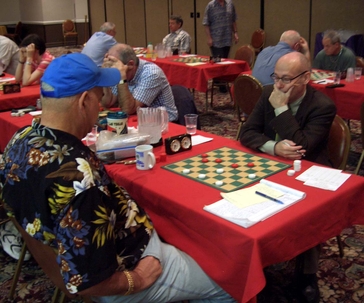
Dave Harwood and Joe Schwartz
2005 USA-UK/Ireland Match
So, what was Joe's other greatest checker thrill? It occurred in one of Joe's favorite cities to visit --- Las Vegas. This personal achievement came at the 2005 USA-U.K. & Ireland International Match held in Las Vegas, where Joe had the best record of anyone present with 10 wins, no losses and 10 draws.
BLACK
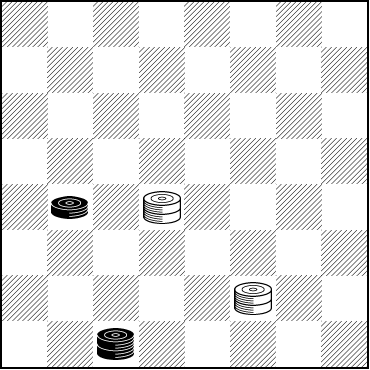
WHITE
White to Play and Win
W:WK18,K27:B17,K30
In addition, here's a problem position arising from one of Joe's games in the aforementioned 2005 match.
Game from 2005 USA vs. U.K & Ireland 8th International Match, Las Vegas
Black: Joe Schwartz
White: Garrett Owens
11-15 21-17 8-11 17-13 9-14 25-21 11-16 29-25 16-20 24-19 15x24 28x19 4-8 22-17 14-18 23x14 8-11 26-23 11-15 25-22 15x24 22-18---A,B 24-28 (see diagram below).
A---While this move does draw, 30-25 is the computer's choice.
B---32-28 loses. Try it out!
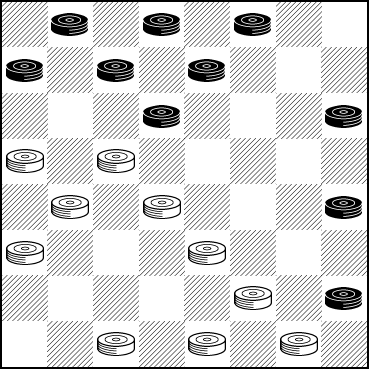
WHITE
White to Play and Draw
W:W13,14,17,18,21,23,27,30,31,32:B1,2,3,5,6,7,10,12,20,28
As always, you can click on Read More to check your solutions to these problems.
The Checker Maven extends its warmest thanks to Richard Beckwith for providing us with this fascinating article.
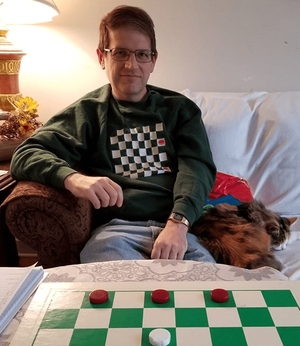
Dr. Richard Beckwith
![]()
Problem Composing Contest 63: Mystery Theme
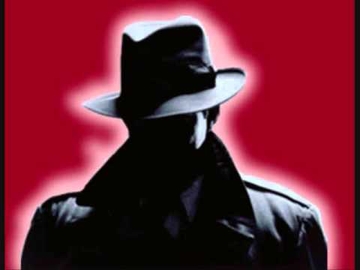
Who doesn't love a good mystery? Who, at one time or other hasn't fancied being a detective and coming up with the cleverly hidden solution to some heinous crime?
Today we're pleased to present a very special entry in Mr. Bill Salot's long-running series of outstanding checker problem composition contests, a series he calls the Unofficial World Championship. Each contest has featured a theme, but today, we're not revealing what it might be. It's a "mystery" theme. Can you solve all the problems and figure out the theme? Thankfully, no terrible crime has taken place but the mystery is nonetheless intriguing, fascinating, and perhaps even worthy of Mortimer Holmes himself (as featured in our series, The Checker Murders)!
To start you out, here's an example. Willie Ryan wrote that this problem, published by George H. Slocum in 1894, was "one of the most exquisite stroke problems on the record." The problems entered in Contest 63 demonstrate some of the same characteristics.
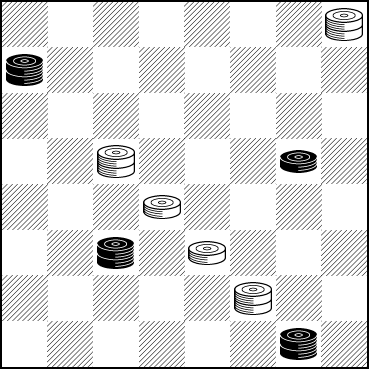
WHITE
White to Play and Win
W:WK4,K14,18,23,K27:BK5,16,K22,K32
Can you get it? You can always click on Read More to see the solution, but we won't give away the Mystery Theme. Be sure to go to the contest page to find our three challenging contest problems. Don't forget to cast your vote for the one you like best.![]()
The Checker Maven is produced at editorial offices in Honolulu, Hawai`i, as a completely non-commercial public service from which no profit is obtained or sought. Original material is Copyright © 2004-2025 Avi Gobbler Publishing. Other material is public domain, as attributed, or licensed under Creative Commons. Information presented on this site is offered as-is, at no cost, and bears no express or implied warranty as to accuracy or usability. You agree that you use such information entirely at your own risk. No liabilities of any kind under any legal theory whatsoever are accepted. The Checker Maven is dedicated to the memory of Mr. Bob Newell, Sr.

